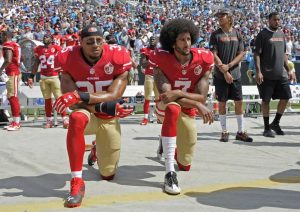I’m a pro wrestling fan.
Whenever I tell people at Georgetown this fact, it seems that I’m met by two very distinct reactions. There’s either total condescension, because many find it difficult to understand that someone who attends Georgetown and also loves watching sports in general would waste their time watching grown men in tights spar in the ring. Or there’s complete excitement, because they themselves are wrestling buffs and are almost ashamed to admit that fact, due to the public shaming that comes with it.
But while my initial statement of dedication may be met with gestures of haughtiness or solidarity, even the most devout of wrestling fans tap out when I go as far as to call wrestling a sport. Even my own dad, who introduced me to the likes of The Rock and Stone Cold Steve Austin when I was just six years old, completely disagrees. Wrestling can’t be a sport in their minds. But I have kicked out multiple times from their attempts to pin my argument to the mat and end it once and for all. So after much frustration, especially in recent months due to my rediscovered love for the sport, I have decided to write a column outlining why wrestling is in a fact a sport.
First of all, let me address the singular fact that prevents wrestling from gaining legitimacy in the first place. Yes, wrestling is fake. If you’re a wrestling fan and you do not know that fact by now, I’m sorry to break the disheartening news to you. The winners of the matches are predetermined and the movesets utilized in matches are executed in a way that attempts to prevent injuries suffered by wrestlers as much as possible. But that should not be a reason to disqualify my argument by hitting it with a steel chair.
A sport, as defined by the reputable dictionary Merriam Webster, is “a contest or game in which people do certain physical activities according to a specific set of rules and compete against each other.”
Arguing that what professional wrestlers do each and every night is not athletic would be like kicking out of multiple RKOs from Randy Orton. It’s very difficult to do. While all wrestlers possess varying styles, they exhibit qualities of other clearly defined sports. Some exhibit the aerial abilities of an Olympic gymnast by jumping off the top ropes, while others demonstrate the quickness and brawling nature of a prize fighter. And this athleticism does not come without risk. Despite being done in a way that seeks to mitigate damage, most of these moves have the potential to seriously injure those involved, on both the executing and receiving end. This gets lost in the mainstream narrative that wrestling is fake. Even executing these moves in the safest way possible still means someone may get hurt.
Now, I understand that the predetermined nature makes competitive wrestling suspect to most outside cynics. But wrestling is competitive by nature. There can only be one Hulk Hogan or John Cena at any given time. Everyone within the WWE is striving to reach that goal. There’s only so much television time that can be allocated to each match and wrestler. In baseball the quality of a team’s pitching or offense will affect the likelihood of who wins and loses; wins and losses in wrestling are determined by someone’s characteristics as a wrestler. These qualities include the ability to get a substantial reaction from the crowd of either cheers, if playing a good guy, or boos, if playing a bad guy as well as interview skills and solid in-ring ability. It would not be in WWE’s best interest to make someone who does not possess the expertise in these skills the champion, just as it wouldn’t be good for the Mets to make me their next starting catcher.
Although many will disagree, the most established of sports media outlets agree with my premise. When WWE star, and former UFC Heavyweight Champion, Brock Lesnar made his decision on whether to continue fighting in the squared circle or return to life in the octagon, ESPN devoted significant coverage to the “1 in 22 and 1.” If you’re not a wrestling fan, I could write a whole column describing the significance of that moniker, as Lesnar is the only person to defeat wrestling icon The Undertaker at the sport’s annual Super Bowl equivalent, WrestleMania. SportsCenter also aired highlights from this year’s WrestleMania.
And while I face one of steepest battles in terms of debates, due to the increased devotion of coverage by ESPN and online outlets such as Bleacher Report, more and more people are starting to respect pro wrestling as a sport. As The Rock would say, people are smelling what wrestling is cooking.




